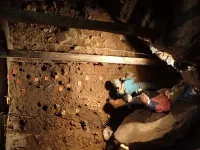People willing to pay more for coffee that's ethical and eco-friendly, meta-analysis finds
2021-06-23
(Press-News.org) Beyond how much cream and sugar to add to their morning brew, coffee lovers also face more serious decisions: one of those is whether or not to buy ecolabelled coffee, which advertises itself as more ethical and environmentally friendly. But whether customers are willing to pay the extra price for these perks remains an unanswered question. In a study publishing in the journal Heliyon on June 23, researchers combined data from 22 studies to conclude that in general, people are willing to pay $1.36 more for a pound of coffee that's produced in an eco-friendly way and are especially partial to coffee that's labelled "Organic."
"We hear in the media or sometimes read in the newspaper that there is an increasing number of ecolabelling logos in the market, and that these logos are sometimes related or even look alike. This may reduce consumers' trust and willingness to pay over time," says first author Nizam Abdu, a Ph.D. candidate and research assistant at the University of Tasmania in Australia. "However, our results show that coffee consumers in some selected countries are still willing to pay a positive and significant premium for ecolabelling."
As many people's go-to beverage, coffee's enormous social, cultural, and economic influence makes it an ideal candidate for ecolabelling, a system that identifies and certifies certain products with ethical and environmental benefits. Common coffee ecolabels include Organic, Country of Origin Labelling (COOL), and Fairtrade (a certification that workers are given fair wages and safe working conditions) and aim to help consumers make informed choices on food safety, health, and environmental impact. However, it's possible that having too many ecolabel options will instead confuse buyers, causing them to avoid buying ecolabelled coffee.
Many previous studies have tried to quantify the public's opinion on different types of coffee ecolabelling. But the studies have varied dramatically in their estimates of how much consumers are willing to pay: some found that people are willing to pay more, while others suggest that people actually are less willing to pay for ecolabelling. As a result, it's been challenging to present a standardized conclusion on the overall effectiveness of ecolabels.
Abdu and his co-author set out to address this gap. They combined data from 22 studies over the past fifteen years, forming an overall dataset of 97 observations across Europe, North America, Africa, and Asia. With their meta-analysis, they wanted to understand what factors give rise to the large range of price estimates and determine once and for all whether consumers are willing to pay more for coffee ecolabelling.
The researchers found that the variation in previous studies came down to a few factors: the region or country under study, surveying methods, types of ecolabels, and publication bias, the tendency for only studies with the desired outcome to be published. For example, there was a noticeable effect on the studies' results when survey participants made yes/no choices about which coffee they'd buy versus when they were given trade-offs and budget constraints.
After taking these things into account, however, they found that overall, ecolabelling worked as intended: people were willing to pay for socially responsible coffee.
"In general, consumers are happy to pay a premium price of $1.36 for a pound of ecolabelled coffee. In particular, we clearly see that Organic is the most crucial coffee attribute," says Abdu. The specific ecolabels of Fairtrade, COOL, and Organic all had values significantly larger than zero, but Organic ecolabelling had the highest value of the three - people were willing to pay an additional $1.14 per pound of coffee for just the Organic ecolabel.
That said, consumer attitudes still varied depending on factors like location. For instance, compared to other regions, people were less willing to pay more for ecolabelled coffee in North America, which may suggest that preference for such a labelling system varies across the regions. The researchers were also surprised to find that while people did care where their coffee came from, they didn't necessarily prefer coffee that was produced near them. "I was expecting consumers would prefer locally produced coffee," he says.
The authors say, however, that their finding still suggests a clear preference among consumers for certain types of ecolabelling. Abdu says, "Our findings are a good indicator that the policy of coffee ecolabelling is working in the global coffee market."
INFORMATION:
This work did not receive any specific grant from funding agencies in the public, commercial, or non-profit sectors.
Heliyon, Abdu et al.: "Willingness to pay for socially responsible products: A meta-analysis of coffee ecolabelling" https://www.cell.com/heliyon/fulltext/S2405-8440(21)01146-4
Heliyon (@HeliyonJournal), part of the Cell Press family, is an open access journal publishing scientifically accurate and valuable research across life, physical, social, and medical sciences journal. Visit https://www.cell.com/heliyon. To receive Cell Press media alerts, contact press@cell.com.
ELSE PRESS RELEASES FROM THIS DATE:
2021-06-23
Researchers have developed a simple lab-based technique that allows them to look inside lithium-ion batteries and follow lithium ions moving in real time as the batteries charge and discharge, something which has not been possible until now.
Using the low-cost technique, the researchers identified the speed-limiting processes which, if addressed, could enable the batteries in most smartphones and laptops to charge in as little as five minutes.
The researchers, from the University of Cambridge, say their technique will not only help improve existing battery materials, ...
2021-06-23
Denisova Cave is located in the Altai Mountains in southern Siberia and is famous for the discovery of Denisovans, an extinct form of archaic humans that is thought to have occupied large parts of central and eastern Asia. Neandertal remains have also been found at the site, as well as a bone from a child who had a Neandertal mother and Denisovan father, showing that both groups met in the region. However, only eight bone fragments and teeth of Neandertals and Denisovans have been recovered so far from the deposits in Denisova Cave, which cover ...
2021-06-23
Humans perceive the world around them with five senses - vision, hearing, taste, smell and touch. Many other animals are also able to sense the Earth's magnetic field. For some time, a collaboration of biologists, chemists and physicists centred at the Universities of Oldenburg (Germany) and Oxford (UK) have been gathering evidence suggesting that the magnetic sense of migratory birds such as European robins is based on a specific light-sensitive protein in the eye. In the current edition of the journal Nature, this team demonstrate that the protein cryptochrome 4, found in birds' retinas, is sensitive to magnetic fields and could well be the long-sought magnetic sensor.
First ...
2021-06-23
Researchers rescued mice from early death caused by a muscle-weakening disease, not by correcting the flawed gene that causes it, but instead by targeting another protein in the same signaling pathway.
Led by NYU Grossman School of Medicine researchers, a new study found that an antibody treatment not only rescued young mice from a form of congenital myasthenia (CM) but also reversed disease relapse in adult mice.
Published online in the journal Nature on June 23, the study revealed new details of the cause of CM, with the better understanding guiding ...
2021-06-23
ITHACA, N.Y. - Scientists at Cornell University and the American Museum of Natural History have identified 2,034 nearby star-systems - within the small cosmic distance of 326 light-years - that could find Earth merely by watching our pale blue dot cross our sun.
That's 1,715 star-systems that could have spotted Earth since human civilization blossomed about 5,000 years ago, and 319 more star-systems that will be added over the next 5,000 years.
Exoplanets around these nearby stars have a cosmic front-row seat to see if Earth holds life, the scientists said in research published June 23 in Nature.
"From the exoplanets' point-of-view, we are the aliens," said Lisa Kaltenegger, professor of astronomy and director of Cornell's Carl Sagan ...
2021-06-23
What The Study Did: Hospital employees were surveyed about symptoms such as a rash, itching, hives or swelling around the face after receiving a messenger RNA COVID-19 vaccine.
Authors: Lacey B. Robinson, M.D., M.P.H., of Massachusetts General Hospital in Boston, is the corresponding author.
To access the embargoed study: Visit our For The Media website at this link https://media.jamanetwork.com/
(doi:10.1001/jamadermatol.2021.2114)
Editor's Note: The article includes conflicts of interest and funding/support disclosures. Please see the article for additional information, including other authors, ...
2021-06-23
BOSTON - Skin problems such as itchiness, rashes, hives and swelling can occur in some individuals after receiving a COVID-19 vaccine, but it's not clear how common these reactions are or how frequently they recur with a subsequent vaccination. Research by led by allergists at Massachusetts General Hospital (MGH) now provides encouraging indications that the reactions are rare, and that even when they do occur with an initial COVID-19 vaccination, they seldom recur after receiving a second vaccine dose.
For the study, which is published in
JAMA Dermatology, a team led by Kimberly G. Blumenthal, MD, MSc, co-director of the Clinical Epidemiology Program within MGH's ...
2021-06-23
What The Study Did: Researchers investigated the association between counties that adopted state mask mandates in Kansas with COVID-19 cases, hospitalizations and deaths.
Authors: Donna K. Ginther, Ph.D., of the University of Kansas in Lawrence, is the corresponding author.
To access the embargoed study: Visit our For The Media website at this link https://media.jamanetwork.com/
(doi:10.1001/jamanetworkopen.2021.14514)
Editor's Note: The article includes funding/support disclosures. Please see the article for additional information, including other authors, author contributions ...
2021-06-23
What The Study Did: The hours worked and patterns of work activities among U.S. physicians before and during the COVID-19 pandemic were examined in this study.
Authors: Xiaochu Hu, Ph.D., of the Association of American Medical Colleges in Washington, D.C., is the corresponding author.
To access the embargoed study: Visit our For The Media website at this link https://media.jamanetwork.com/
(doi:10.1001/jamanetworkopen.2021.14386)
Editor's Note: Please see the article for additional information, including other authors, author contributions and affiliations, conflict ...
2021-06-23
What The Study Did: Researchers examined family voucher-based kidney donations and the capability of voucher redemption to provide timely kidney transplants.
Authors: Jeffrey L. Veale, M.D., of the University of California, Los Angeles, is the corresponding author.
To access the embargoed study: Visit our For The Media website at this link https://media.jamanetwork.com/
(doi:10.1001/jamasurg.2021.2375)
Editor's Note: The article includes conflict of interest disclosures. Please see the article for additional information, including other authors, author contributions and affiliations, conflict of interest and ...
LAST 30 PRESS RELEASES:
[Press-News.org] People willing to pay more for coffee that's ethical and eco-friendly, meta-analysis finds

